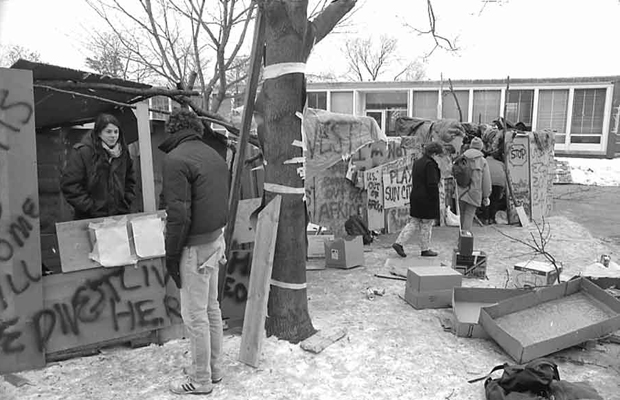Campus mourns Nelson Mandela
Faculty, students inspired by former president of South Africa

In 1986, students live in shantytown on campus to encourage divestment from South Africa.
Nelson Mandela, the 95-year-old former South African president who helped end apartheid, died yesterday, leaving behind a legacy of compassion and social justice.
Brandeis students and faculty have always been closely aligned with Mandela and the campaign to promote human equality. In the 1980s, students built a shantytown on campus to protest apartheid and encourage divestment. This February, two of Mandela’s grandchildren, Kweku Mandela-Amuah and Ndaba Mandela, will deliver the keynote address at DEIS Impact, a weeklong forum on social justice.
“Brandeis University mourns the loss of one of the world’s greatest freedom fighters and shining examples of the human capacity to never quit fighting for that which is right,” says Jamele Adams, dean of students. “It is his own words — ‘For to be free is not merely to cast off one’s chains, but to live in a way that respects and enhances the freedom of others’ — that reflect the ‘rhythm’ of his legacy and the monument of his deeds as they rest in our minds. Nelson Mandela is a hero and legend who stood for justice for all.”
Mandela inspired a generation of activists to protest their universities’ financial ties with South Africa. It’s important to remember that legacy without romanticizing it, and to recognize his achievements were the result of decades-long struggles, says Chad Williams, chair of the African and Afro-American Studies department. Flags will be lowered to half-staff in his honor on campus, where in the 1970s and '80s, students rallied for the Board of Trustees to divest from South Africa.
“That was an incredibly powerful moment on this university’s campus,” says Williams.
Professor Ted Sasson ‘87, a senior research scientist at the Cohen Center for Modern Jewish Studies, who was then a student, heard Mandela speak on the Hatch Shell in Boston in 1990, shortly after he was released from prison.
“I remember him thanking Bostonians for their leadership role in the movement against apartheid, in helping to persuade companies, universities, towns to divest,” Sasson says. “He cited that movement as having been especially influential, and that struck me because I felt like I was witnessing some kind of validation of the impact of social and student activism.”
Tenacious, committed students won out after lengthy protests, says longtime sociology professor Gordie Fellman, including forums, teach-ins and marches. Students slept in the mock shantytown they created during a cold February, and a group of students was even arrested after staging a non-violent protest that blocked the university entrance.
“It’s important to remember Nelson Mandela not just as an iconic figure, but to remember what he stood for,” Williams says. “He’s such an important symbol for forgiveness and the ability of societies to fully transform themselves. Every moment of his life was committed to increasing opportunities for freedom and equality.”
President of the African Business Club, Nour El Fath Azari, MBA'14, says, "In Africa, Mandela is known as the father of the nation, and that pretty much says everything about him."
Fellman says Mandela represents the best in human beings. “I teach an Israeli-Palestinian Conflict course every year. One of the things that came to mind is that there’s no Mandela or F.W. de Klerk there – people whose path is reconciliation rather than revenge.”
Ilan Troen, the Stoll Family Chair in Israel Studies and director of the Schusterman Center for Israel Studies, was a representative of Ben Gurion University in Israel in 1997, when he conferred an honorary doctorate on Mandela, who he describes as a great man who defined charisma.
“It reflected his commitment to peace, because he had long expressed sympathy for Palestinians but also understood the value and need for a Jewish state,” Troen says. “It was a symbolic occasion and represented his bridging of different worlds and interest in reconciliation.”
Mandela brought representatives from Ben Gurion University to visit his and his comrades' former cells on Robben Island, an experience that Troen says has had a deep impact on him and his teaching.
“Anyone who stands in Robben Island and looks north to Capetown can see the tests they faced, not only from their tormentors. The land they loved and wanted to rejoin was in eyesight all that time," he says.
Brandeis held a peace vigil in the Peace Circle near Goldfarb Library today, Dec. 6, to honor the memory of Mandela, and it lowered the flags on campus to half-staff. The Brandeis African Student Organization will hold a candlelight vigil Wednesday, Dec. 11, at 4 p.m. in the Peace Circle near Goldfarb Library. Those attending are asked to wear the colors of the South African flag (red, blue, green, yellow, black and white) in honor of Mandela.
Categories: General, Humanities and Social Sciences, International Affairs





